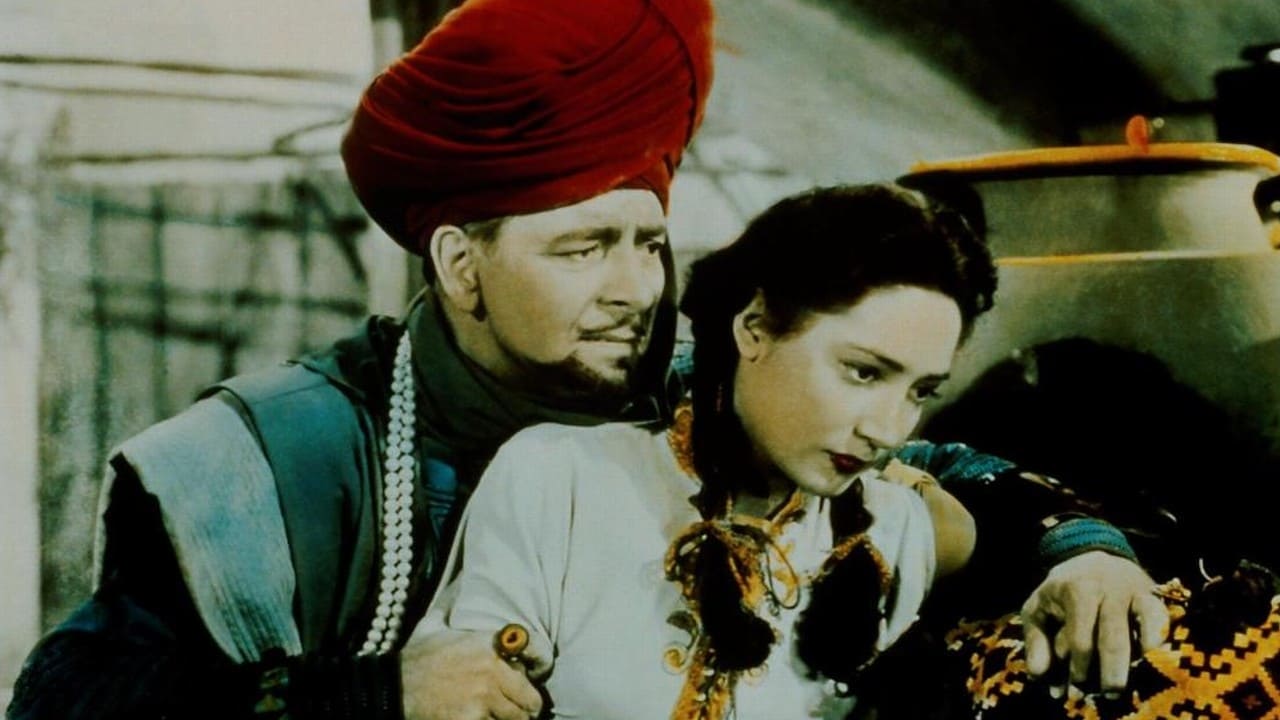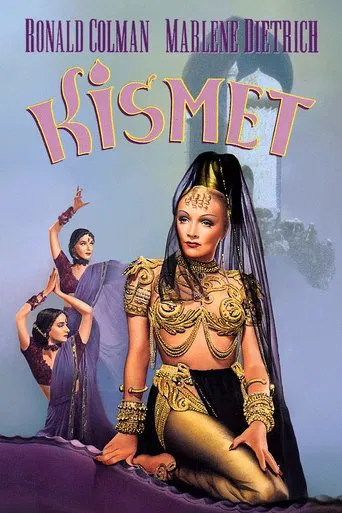

Even though Joy Ann Page sings a song as Marsinah, this film sadly lacks the poetry of the 1950's musical version. It is beautiful to look at, but like a statue of ice, it leaves a puddle behind it which needs mopping up. Ronald Colman is excellent as Haji, the beggar, and when he is on screen, the film is filled with amusement, yet never reaches the romantic potential it strives for. The movie has an interesting opening sequence, explaining who all the major characters are, from Colman and Page, to James Craig's Caliph (being under-minded by Edward Arnold's evil but easy going Wazir) and the Wazir's beautiful but scheming wife, played with the ten veils that Salome never received by Marlene Dietrich. This is famous for a dance that Dietrich does with gold paint on her legs, but while her face is certainly beautiful and youthful, the paint only indicates that the rest of her is aging.Hugh Herbert brings his inappropriate use of "Woo Woo's" to one of Colman's sidekicks, and Florence Bates in dark make-up and shrouds is comically imperious and insulting. The set seems to go on forever, as if MGM opened the walls between sound stages, bought every can of colored paint in Los Angeles and let the art director go haywire. The magic acts Colman performs are certainly amusing and the final scene has him bouncing around the set much like Douglas Fairbanks Sr. did in "The Thief of Bagdad". There's certainly a lot to like in this movie, but it lacks the fun of the same type of film that Maria Montez was doing at Universal or Dorothy Lamour had been doing at Paramount.
... View MoreHad Harold Arlen and E.Y. Harburg written anything memorable from this version of Kismet, Robert Wright and Chet Forrest might not have ever adapted Alexander Borodin's music to make their acclaimed version of Kismet in the fifties. We should all be the poorer for that.Music is the weak spot in this version of Kismet, the songs sung by Joy Page and Marlene Dietrich aren't anything memorable. But classical American actor Otis Skinner who created the role of Hajj on Broadway back in 1911 is replaced by probably the only man in Hollywood who could have made that Edwardian dialog palatable to modern ears. Of course that would be Ronald Colman, a man I could get joy listening to him recite Buffalo Phone Directory.This was one of MGM's biggest productions in the Forties, they splurged for technicolor and if you're going to have Marlene Dietrich play the seductive princess go for the gold. Lots of delightful cries emerged from cinema audiences when those golden painted legs of Dietrich were shown. Even on television they're still quite a sight.Unfortunately the sound version of Kismet that Otis Skinner made in 1930 for Warner Brothers appears to be a lost film so we can't compare his interpretation of the lead with Colman. But in watching Colman's performance it seemed to be his Francois Villon aged so that he now had a teenage daughter. Anyway, it works beautifully.James Craig is the earnest young caliph who I kept expecting to sing A Stranger in Paradise and Edward Arnold is the villainous vizier. Mr. Arnold played him like the political boss of ancient Bagdad.MGM also filmed the better known musical version of Kismet with Howard Keel, Ann Blyth, and Vic Damone putting their marvelous voices to that classical score. That version has the music no doubt, but this one has Colman and Dietrich, so take your choice and you can't go wrong with either.
... View MoreTo be bothered by he fact that all the principals of this movies were Western is to miss the point. This is a document of a given time and place (Hollywood in 1944). Ronald Coleman was born to play the part of the poetic beggar prince. Who could be better to declaim the bits of Omar Khayam in the script. It's a little like his take on Francois Villon in "If I Were King". Marlene Dietrich is magnificent as a Macedonian princess in the Grand Vizier's harem. She does a beautiful and seductive dance. Edward Arnold supplies real menace as the heavy just as he did in "Meet John Doe". The whole premise of a movie like this is naive and unhistorical but the production was so ambitious and sumptuous that it transcends that shortcoming.
... View MoreThis seldom seen non-musical version has Ronald Colman as the beggar who tries to pass his daughter off as a princess in the Baghdad of the Arabian Nights. Colman was not a bad actor and when cast in tosh like "Lost Horizon" or "Random Harvest" managed to bring a touch of class to the daft proceedings, but this is way too camp even for Colman, ("I suppose queens do play around the streets of Baghdad at night", says Harry Davenport's old Agha at one point). His performance is a mixture of urbanity and dullness.The queen he is in love with is played by Marlene Dietrich with her blonde hair piled on her head like a snake and with her thick Tuetonic accent is even more out of place than Colman. When she moves she is like a drag-queen ill-at-ease in her costume. The young lovers are James Craig, that hunk of beefcake culled from ham, and someone called Joy Ann Page. Charles Rosher's colour photography is a bonus but really, this makes the Minelli version look like a masterpiece.
... View More